Blogging & Musing
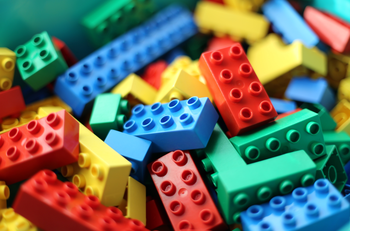 I've said this before, but it bears repeating—we readers are a lucky bunch to have OTHER people willing to write novels for us. I certainly can't do it.
I've said this before, but it bears repeating—we readers are a lucky bunch to have OTHER people willing to write novels for us. I certainly can't do it.
Here's what author Amos Oz has to say on wriitng:
It is like reconstructing the whole of Paris from Lego bricks. It’s about three-quarters-of-a-million small decisions. It’s not about who will live and who will die and who will go to bed with whom. Those are the easy ones.
It’s about choosing adjectives and adverbs and punctuation. These are molecular decisions that you have to take and nobody will appreciate.... That is the business of three-quarters-of-a-million decisions.
Wait...that's the hard part? PUNCTUATION? Nah, that's nowhere near the hard part. When someone says to me (and people have surely said it to you), "You should write a book," MY JAW DROPS in dumb wonderment. Just how smart do people think I am? (I'm not.) Even more to the point, just HOW EASY do they think writing novels is? (It isn't.)
A BAZILLION Legos—not a million—go into novel writing. Here's just some of the stuff authors have to think about—stuff we take for granted but then get ALL TETCHY over if authors get it wrong:
- WHO will tell the story, whose voice (or voices) will be used? (It better be a convincing.)
- WHAT information will be withheld? When will it be revealed? Who will reveal it, and how?
- IS the dialog believable—is it the way people really speak? (Not so easy.)
- HOW much research is needed to establish setting—location and era.
- HOW will the characters be shaped; how much depth will they be given; what will make them life-like and compelling?
- HOW will the plot be structured—what's the arc of the story?
- WHAT underlying concerns, themes, or ideas will suffuse the book? What big questions does the author want to explore?
- WHAT about all the literary stuff—imagery, symbolism / metaphor, irony, and allusions—which gives the story richness and resonance?
Writing is a hard-knock life. Too hard for the likes of me. AND YET, it's remarkable, isn't it, that with the rise of web-based self-publishing, lots and lots of people are heading to the key board to try their hand(s) at writing books.
Bless them one and all. They are BRAVE SOULS, brave souls indeed!
 Cool photo...could be right out of Anne Fadiman's Ex Libris: Confessions of a Common Reader—a terrific collection of essays about a lifetime spent in the pursuit of books: reading, writing, and collecting them. (The author is best known for The Spirit Catches You, You Fall Down, 1997.)
Cool photo...could be right out of Anne Fadiman's Ex Libris: Confessions of a Common Reader—a terrific collection of essays about a lifetime spent in the pursuit of books: reading, writing, and collecting them. (The author is best known for The Spirit Catches You, You Fall Down, 1997.)Here's what happened: Having sublet her apartment, Fadiman returns home from a lengthy trip. It turns out her subleasers are two design-oriented guys who thought they'd do her a favor and spiff the place up a bit.
So what did they do? They rearranged her bookshelves. Nothing practical mind you, like genre, subject, or author name...no-no-no. That would be PROSE-AY-ICK. They reorganized the books by—you guessed it—COLOR. And Fadiman? Amused...and horrified.
Well, I've got some pretty spiffy bookshelves myself, built by Victorians 120 years ago. Here's what mine look like.
 A beautiful mess. Books are crammed in topsy-turvy and arranged willy-nilly, with no claim to the niceties of decor or organization. It's all DVDs, old Disney videos, kids crayons, cookbooks and wine glasses (off to the left), along side Shakespeare (my grandfather's 1920s set).
A beautiful mess. Books are crammed in topsy-turvy and arranged willy-nilly, with no claim to the niceties of decor or organization. It's all DVDs, old Disney videos, kids crayons, cookbooks and wine glasses (off to the left), along side Shakespeare (my grandfather's 1920s set).Bookshelves are deeply personal things. This lovely mess has meaning: it reflects a sort of "what-you-see-is what-you-get" approach to our lives. More importantly, the mess contains a good bit of family history, giving us pleasure just to look at it.
So how personal are your bookshelves—what do they say about you? Finally (and we've talked about this before), how much longer will bookshelves grace our homes? What will we lose when everything is digitalized. And, yes, I ♥ my Kindle.
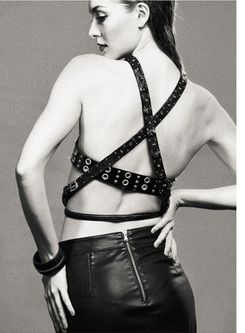 Boy! Girls are taking a hit these days—in the myriad books written and millions of readers propelling them to the top of the charts.
Boy! Girls are taking a hit these days—in the myriad books written and millions of readers propelling them to the top of the charts.
The girls I'm referring to are those fictional sociopaths, Amy (Gone Girl), Jodi (Silent Wife), Rachel (Girl on the Train), and most recently Lacey and Dex (Girls on Fire). *
Then there's Peggy Orenstein's nonfiction Girls & Sex about the troubling state of affairs as young women negotiate their way in the brave new world of hook-up sex.
Do notice, btw, the frequent use of "girl" in the titles. A "girl" is a young female lacking the stature—and substance—of a mature woman. Like what's up with that? (See later post on Girly Girl Titles.)
Marketers are surely taking a title cue from Steig Larsson's spectacularly successful "Girl with the Dragon Tattoo" series. But Larsson's heroine, Lisbeth Salander, while outlandish, is a cut above the new "girls." Amy, Jodi, Rachel, and friends are downright ... frighteningly ... pathological.
Yet these books are cresting the bestseller charts...because we readers are scooping them up.
So what wave are these books riding? Something's up—some anxiety or unease within women, or about women, which these hugely popular books are playing into. What an interesting topic for book clubs to take up!
My 20-something daughter says it's about time: Males have long been cast as psychopaths, and women are just catching up—a sign of equity in her eyes. Well, maybe.
Except that these books are coming out fast and furiously—one after another—and hitting the charts in a HUGE way. It's puzzling. For some reason, we can't get enough of GIRLS GONE BAD. Why is that? (Also take a look at a previous post: Gone Girl Marriages—Creeping Us Out.)
* JUST RELEASED . . .
Add to our list the newest girls-gone-bad novel, The Girls by Emma Cline, based on the Charles Manson cult murders. These bad girls got the publishing world so worked up that author Cline walked away with a cool $2 MILLION. And this is her first book!
 ritten by Cheryl Jones* for LitLovers.
ritten by Cheryl Jones* for LitLovers.We all know reading to youngsters is important. But aside from the pure joy we feel, it's easy to overlook why it's so important.
Take a look at these highlights from a study conducted by the Melbourne (Australia) Institute of Applied Economic and Social Research.
Reading to Young Children
------A Head Start in Life
--------—Ages 4 to 5—
♦ Reading to this age group has a significant positive effect later in life—on reading (language & literacy) and cognitive skills (numeracy & cognition).
♦ Children read to more frequently achieve higher scores on the [Australian] National Assessment Program for both Reading and Numeracy for ages 8 to 9.
♦These differences in reading and cognitive skills are not related to the child's family background or home environment.Authored by: G. Kalb and J.C. van Ours, 2012
Print size matters. Based on work by Glenn Dorman, a child development specialist, young children’s eyes are still developing, which is why lettering in children's books is so large (small letter aren't helpful). Good rule of thumb: the younger the child, the bigger the letters.
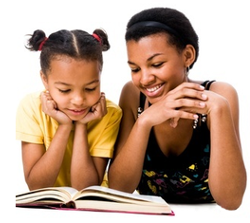 Frequency matters, too. According to the Melbourne study (above), reading to children 3-5 days a week advances reading skills by six months. Reading 6-7 days a week can advance their skills by a full year!
Frequency matters, too. According to the Melbourne study (above), reading to children 3-5 days a week advances reading skills by six months. Reading 6-7 days a week can advance their skills by a full year!One reason early reading is so beneficial is that it strengthens vocabulary and thinking skills—enabling children to ask questions when they're presented with difficult new material. The greater the vocabulary, the easier it is to ask for help.
Other studies over the years have shown that when children fall behind in the lower grades they often stay behind in the upper grades. Worse, they're at risk of dropping out later on.
 A love of reading is a precious gift to give a child. And as every person who visits LitLovers knows, learning doesn't end with high school or college—which is why you happen to be here, reading this, right now.
A love of reading is a precious gift to give a child. And as every person who visits LitLovers knows, learning doesn't end with high school or college—which is why you happen to be here, reading this, right now.Starting early with reading not only gives kids an extra boost when they're young—it turns into an advantage for life. It can be a key factor in keeping them engaged in school, as well as keeping them in school. And, importantly, it can inspire in them a life-long love of reading—just like you.
*Cheryl Jones is a blogger and a free-lance witer. Visit her blog here.
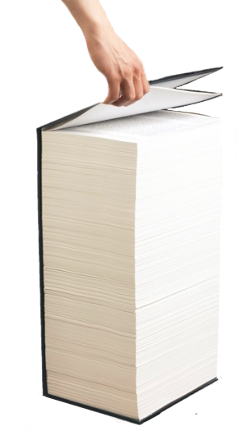 case you hadn't noticed, the novel seems to be getting longer and longer, some clocking in at 700-800+ pages.
case you hadn't noticed, the novel seems to be getting longer and longer, some clocking in at 700-800+ pages. In a gag news article we wrote a while back, we riffed on the idea of authors taking performance enhancing drugs, enabling them to pound out longer and longer sentences, leading to "stupefyingly longer" books.
Now someone's pushing back. Although publishers have pressed him "to write longer books," Welsh author Cynan Jones praises the short novel.
He points to The Old Man and the Sea, They Shoot Horses Don't They?, Animal Farm, even Gatsby (though Fitzgerald worried it was too short). Here's Cynan Jones on the subject:
I've never met a reader who doesn't like short novels.... For me, the opportunity to sit somewhere for two hours and read a book from start to finish—to submerge myself in it—is a thrilling experience. A short novel makes a straightforward demand: give me this time.Readers don't buy books by the the pound, Jones points out. And publishers should get over their obsession with longer works. "The only thing to be taken into account should be the impact a piece of writing has," says Jones. Yep, we couldn't agree more.
Cynan Jones is the author of The Dig and, more recently, Everything I Found on the Beach. The full article can be read in Publisher's Weekly.
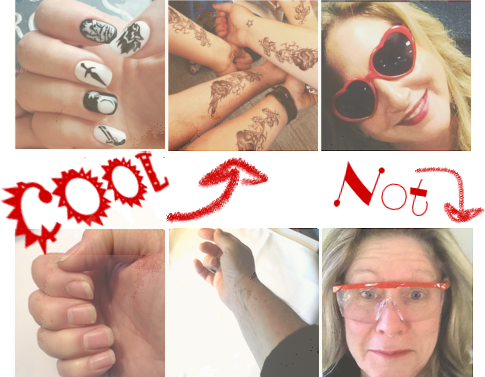
By Molly Lundquist, LitLovers.
Who doesn't want to be cool? Well, my friends, THIS is what cool looks like … and what it doesn't.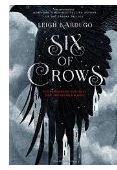 I'm a wanna be. Just when I deluded myself that—after all these years—I might be getting close, here comes LEIGH BARDUGO, author of the Grisha Trilogy (Shadow and Bone, etc.)
I'm a wanna be. Just when I deluded myself that—after all these years—I might be getting close, here comes LEIGH BARDUGO, author of the Grisha Trilogy (Shadow and Bone, etc.)
And now Leigh's got a brand new fantasy novel—Six of Crows, published to rave reviews. Think Oceans Eleven with a bunch of adolescents.
Not only is the book cool, but take a look at the photos of Leigh and friends on Instragam. Top row is Leigh. Bottom… guess who. Me. Cool? Not even close.
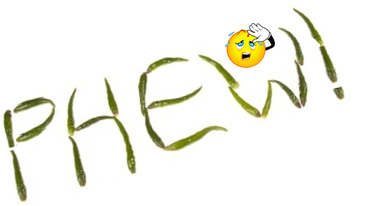 It might be time to remove BOOKSTORES and LIBRARIES from the list of endangered species!
It might be time to remove BOOKSTORES and LIBRARIES from the list of endangered species!
Over the past several years, those dealing in print books were preparing themselves for extinction. With ebook sales skyrocketing, it looked as if end times were on the horizon. But that may have changed.
According to the Association for American Publishers (AAP), digital ebook sales have dropped—by about 10%. Okay, that's not a lot, but it's enough to give books-on-shelves some wiggle room...and booksellers some hope. *
Adding to the good news, the American Booksellers Association (ABA) says its member bricks & mortar bookstores have increased their numbers over the past five years—from 1,400 to 1,700.
Moreover, some surveys show that young readers, the ones in love with digital devices, still prefer reading on paper.
Not that we readers are leaving our digitial devices behind: it's more like we're becoming "hybrid readers," toggling from hard copies to ebooks. I'm a hybrid—I love my Kindle but also enjoy the feel of a print book. You can read more in the New York Times.
So what about you? Are you a hybrid reader, strictly ebooks, or strictly paper ones?
* This just in . . . Publishers Weekly reported that April, 2016, book sales rose 8.8% over March—which means bookstore sales have risen every month this year compared to 2015. Even more impressive, bookstore sales have outpaced growth for the entire retail segment for the first five months of 2016.
 Ah, Pinterest—all those lists and photos of the BEST PLACES TO READ...inside, outside, in cities around the world. But the novelty's wearing thin.
Ah, Pinterest—all those lists and photos of the BEST PLACES TO READ...inside, outside, in cities around the world. But the novelty's wearing thin.
And that got us to thinking—perversely—about where you DON'T want to be caught with a book. So we put together our own list. This one is about . . .
THE 7 WORST PLACES TO READ
1 — Job Interview
Terrific resume. Great experience. Top-notch references. And there you sit, peering down at a book—just to prove you can multi-task. Gee, how could they not hire you?
2 — Lunar Landing Craft
You wanna screw this up? Your one big shot at making history? The world is watching, so put the book down—now—and land this baby.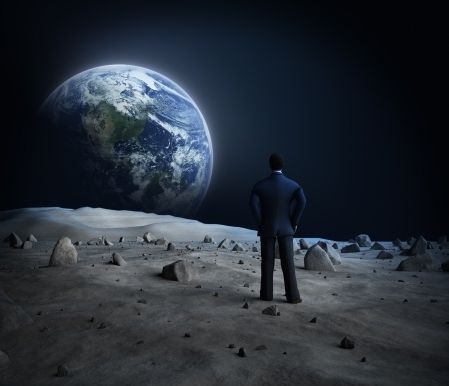
3 — Parent-Teacher Conference
You think you're showing off your reading skills—which have rubbed off on your gifted kid. But while you sit there with your nose in a book, the teacher?...well, she thinks differently.
4 — Speeding Traffic
Eyes on the road; hands on the wheel. Do we really need to explain this one?
5 — Tax Audit
That's right, just keep on reading. Nonchalance implies innocence. He'll see right through you.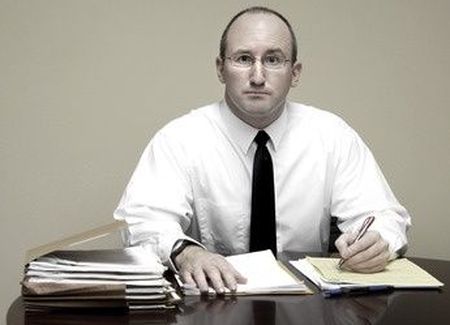
6 — Real Bedroom
This isn't on Pinterest—because this is LIFE. Picture yourself curling up here with a book and a Pinot. You can't, can you?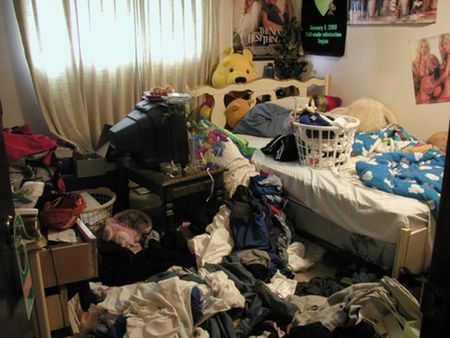
7 — Empire State Building
You could accidentally drop your book from the Observation Deck—you would see it accelerate at (32 ft. per sec.)2, hitting the ground in 15 sec. at a terminal velocity of 50 mph. And THAT would crack the book's spine—which everyone knows is a crying shame.
So, dear reader, you tell us...what's YOUR worst place to read?
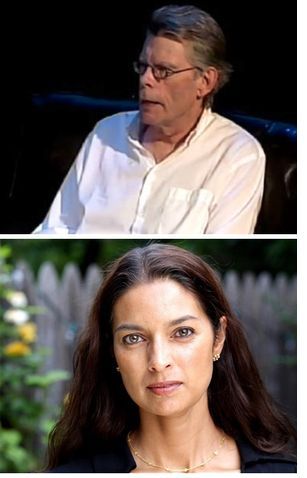 Hardy (or hearty?) congratulations go to STEPHEN KING and JUMPHA LAHIRI, who are to be awarded the prestigious Medal of Arts by President Obama. The presentation will take place at a White House ceremony today.
Hardy (or hearty?) congratulations go to STEPHEN KING and JUMPHA LAHIRI, who are to be awarded the prestigious Medal of Arts by President Obama. The presentation will take place at a White House ceremony today.
The National Endowment for the Arts awards medals each year to a wide range of individuals in the arts—actors, authors, dancers, film makers, musicians, and visual artists (painters and sculptors)—recognized for their "outstanding contributions to the excellence, growth, support and availability of the arts in the United States."
A (tiny) sampling of previous recipents includes such luminaries as Saul Bellow, Rene Flemming, Clint Eastwood, Earnest J. Gaines, Dizzy Gillespie, Ray Bradbury, Jacob's Pillow Dance, Roy Lichtenstein.
Below is what the White House has to say about the choice of King and Lahiri:
Stephen King for his contributions as an author. One of the most popular and prolific writers of our time, Mr. King combines his remarkable storytelling with his sharp analysis of human nature. For decades, his works of horror, suspense, science fiction, and fantasy have terrified and delighted audiences around the world.
Jhumpa Lahiri for enlarging the human story. In her works of fiction, Dr. Lahiri has illuminated the Indian-American experience in beautifully wrought narratives of estrangement and belonging.
Couldn't have said it better ourselves.
This year's winners also include theater director John Baldessari, choreographer Ping Chong, actress Miriam Colon, the Doris Duke Charitable Foundation, actress Sally Fields, visual artist Ann Hamilton, composer and singer Meredith Monk, tenor George Shirley, the University Musical Society, author and educator Tobias Wolff.
By Molly Lundquist—
Daisy Goodwin's The Fortune Hunter just came out in paperback, so given the hype (see NY columnist Liz Smith's review for one) I took a look...and I loved it.
The novel centers on a romantic triangle populated by actual historical characters: an Austrian empress, British heiress, and dashing cavalry captain. Some of Goodwin's story is true, some imagined. Sound like fun? It is.
Young Charlotte Baird is heiress to the Lenox fortune and considered quite a catch during her debut in London. Like many a good heroine, Charlotte defies convention much to her family's dismay. Yet it's that very independent streak that attracts the eye of handsome Captain Bay Middleton. 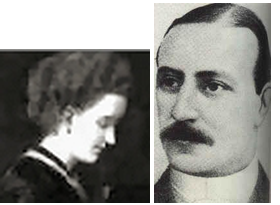 Unfortunately, Bay himself catches the eye of visiting royalty: Empress Elisabeth of Austria who has come to Britain for the hunting season. Famed throughout Europe for her beauty, Sisi, as she is known, intoxicates Bay, who is now torn between two women. (Photos left: Charlotte? and Bay)
Unfortunately, Bay himself catches the eye of visiting royalty: Empress Elisabeth of Austria who has come to Britain for the hunting season. Famed throughout Europe for her beauty, Sisi, as she is known, intoxicates Bay, who is now torn between two women. (Photos left: Charlotte? and Bay)
The story, though, offers more than a standard romance: we get an insider's view of the Victorian class system and the burdens it imposes, not on society's lower rungs but, in this novel, on the upper ones—even on royalty.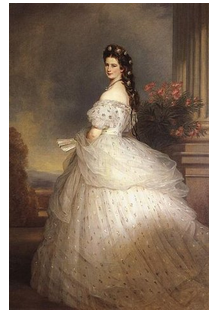 For as much as Americans are titillated by all things Downton Abby, Goodwin shows us a darker side. We see the demands for mindless conformity, especially for women. We watch how those not quite up-to-snuff (the untitled) face stinging humiliation by their "betters" (the titled). And we're privy to the tacit understanding that women are mere commodities in a cynical marriage market.
For as much as Americans are titillated by all things Downton Abby, Goodwin shows us a darker side. We see the demands for mindless conformity, especially for women. We watch how those not quite up-to-snuff (the untitled) face stinging humiliation by their "betters" (the titled). And we're privy to the tacit understanding that women are mere commodities in a cynical marriage market.
The book holds a particular interest for me. A couple of years ago, I stumbled across a 1962 movie with Romy Schneider (anyone remember her?) as Sisi, the lovely 16-year-old girl who captured the heart of the Emperor of Austria-Hungary. (Photo right: Empress Sisi)
The Fortune Hunter picks up 22 years after that romantic coupling to show the toll that royal life—with its sycophantic courtiers and stultifying dullness—has taken on Sisi. That part is true, too, and so is this—unhappy at home, Sisi traveled a good deal to remove herself from the rigid confines of the Austrian court.
This is an engaging read and an easy one, too. Goodwin has drawn her secondary characters broadly; they're somewhat cartoonish, which only makes them more fun to loathe. The author has taken more care with her leads, however, lending them a greater degree of depth. She also writes in rich detail when it comes to riding to the hunt, the new-fangled photography, and the beauty regimes of royalty (which involve slabs of veal...I'll say no more).
Read and have fun. I did. Oh, and don't miss our Reading Guide for The Fortune Hunter, complete with discussion questions.
* This review is sponsored by St. Martin's Griffin, publishers of the Fortune Hunter. The content of the review is an objective opinion by LitLovers.
Site by BOOM
![]()
LitLovers © 2024

